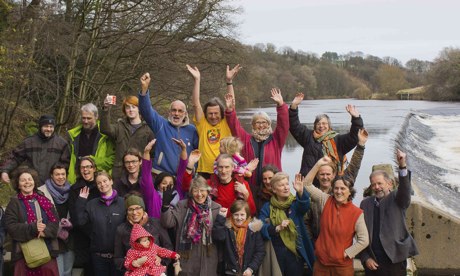
It's nearly a year since I wrote about my community's attempt to get a hydro scheme constructed on the River Lune, near Lancaster. I explained how hard it is for people like us – mostly volunteers with jobs and family responsibilities – to navigate the bureaucracy and other obstacles which face any group wanting to build a community energy scheme.
Little did I realise then that it would take another ten months to get Halton Lune Hydro to the point where we can start constructing our 200kW, 1000 MWh-pa hydro, which should eventually produce enough clean electricity to power over 300 homes and save 500 tonnes of carbon.
The problems kept coming. There was a dispute with a landowner that nearly killed the project. The angling lobby also caused problems with critical articles in Salmon and Trout Magazine and constant objections lodged with the Environment Agency. While individual fishermen were supportive, there is a section of the angling fraternity that has a knee-jerk opposition to hydro schemes, in the same way that sections of the Conservative party automatically oppose wind turbines.
A community energy revolution?
The government's community energy strategy, which is supposed to create a "community energy revolution", is full of fine words, working groups and proposed actions, but none of them is likely to change the determined opposition of many Conservative MPs to wind and solar farms in particular – the very projects that should be bread and butter to community energy groups.
And can a working group on planning issues help with sorting land and access problems or simplify the route through the extraordinarily complex bureaucracy? Take for instance our attempt to pre-register for the feed-in tariff before the end of 2013 – necessary to guarantee our future income. When, early in December, we tried to discuss this with regulator Ofgem, we were told they wouldn't talk to us until after we made an application. But we couldn't make an application until the final Environment Agency licenses came through.
That gave us 14 days, half of them between Christmas and New Year, to get it sorted. There followed a frustrating exchange when we were told there was no proof we had a grid connection agreement, despite a senior engineer from Electricity North West confirming that we did. The engineer told us that this unhelpful attitude was becoming par for the course. Again the strategy will merely set up a working group to address grid connection issues.
Support for community groups
Despite the frustrations, we did come across some incredibly able and helpful individuals in the organisations we dealt with. Both in the Environment Agency and in Defra (which is managing our EU grant) there were committed officials who, despite being hard-pressed, worked closely with us to help us through the maze.
Will the community energy strategy ensure community groups get this kind of support as a matter of course? It does promise more advice to new groups about how to set up a scheme, but who will have the time to offer that support when staff in the Environment Agency and local planning departments are facing hefty budget cuts?
So it seems community energy projects will still depend on the skills and perseverance of those involved. Our project has worked because it's a good project technically and we happen to have some very determined and experienced individuals living locally.
There were two extraordinarily skilled engineers who were able to speak the Environment Agency's language, and knew how to choose a turbine, fish screens and electrical systems.
We've also had expertise within Lancaster Cohousing, the eco-development where I live. My partner, Kevin Frea, has already got two community energy projects under his belt, and has become adept at solving the problems bureaucracies throw at us.
Kevin's current challenge is to raise between £500,000 and a million pounds from a community share offer to finance the hydro scheme. The more we raise the quicker money goes back to the community.
It's a good offer: a predicted 5% return on investment, backed by the feed-in tariff. And then there's that warm glow of investing in something that generates green energy and raises money for worthy causes - more than a million pounds over 20 years if all goes to plan. We've already reached £250,000 so we think we're on track. But none of us are venture capitalists or investment experts.
The strategy promises an extra £10m to help urban community groups get schemes started. Perhaps the government could also invest in community energy schemes directly or offer a government guarantee to investors, rather than undermining projects by constantly changing their green energy policies. Now that really would help.
• Alison Cahn is a journalist, film-maker and communications specialist living in Lancaster Cohousing
To find out more about the Halton Lune Hydro project, go to www.haltonlunehydro.org

